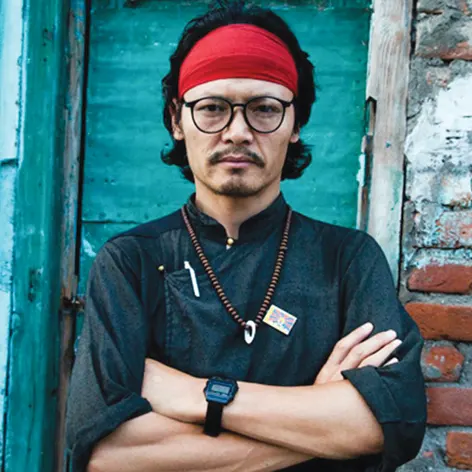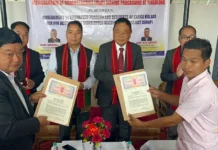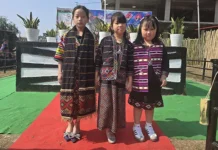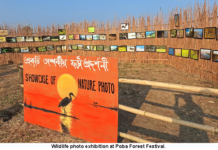[ Tongam Rina ]
Tenzin Tsundue never seems to rest. The Tibetan activist and poet is ubiquitous, moving from jails to yet another event.
When a high-profile Chinese leader visits, the Indian government’s first search is for Tenzin. He famously climbed the scaffolding of the Oberoi Hotel in Bombay, where he displayed a ‘Free Tibet: China, go get out’ banner during Chinese Premier Zhu Rongji’s visit in 2002.
Tsundue wears a red bandana, symbolising his lifelong commitment to his country’s freedom. He has not stopped advocating for Tibet’s freedom. In his activism and written words, it’s all about a free home.
His heart-searing poems express a poignant yearning for home and explore the complexities of his refugee identity. His latest publication is Nowhere to Call Home.
Tsundue, who resides in Dharamshala (HP), is currently in Itanagar, participating in the ongoing Arunachal Lit Fest. I started by asking him about home and the future of the Tibetans.
Tongam Rina: You write eloquently about rooms, homes, and homes far away from home with a lot of longing. What does belongingness mean to you?
Tenzin Tsundue: In my latest book Nowhere to Call Home, I say “Nang is Home in Tibetan. It also means inside, inward, within, and the philosophical in. Home is not a house but the purpose that takes us places, and sometimes away from our own home. Reasons to live can make strangers a family and no country foreign. When we come out of our comfort zone, we learn to make ourselves feel at home anywhere. Stuck at home, with old habits and malice, a house can sometimes turn into a prison. Once a prince from the land of the Ganges left his family and kingdom in search of higher truths and never returned. He found a key to happiness which, even to this day, is practiced as the path to freedom. To many, this is Home. As a born-refugee, who is neither able to return nor settle down in exile, I often feel like a kite cut loose; our belongingness is imagined.
TR: Identity deeply permeates your poems. Do you feel burdened by having multiple identities?
TT: Exile is a fertile ground for personal growth. Refugees adapt, learn new languages, customs, clothing, food; and mixed marriages bring about hyphenated identities. The exile often runs the risk of forgetting the homeland and assimilating with the refuge. The shelter becomes the home.
Therefore, it is memory that gives him a sense of identity, and for the new generation, the inherited memory. There is no choice; an overwhelming cloud of dust envelops, and slowly you become a different person. It is against these odds that a refugee returns home beside the robust physical struggle for freedom. But today, immigrants undergo the same process, except that the obvious availability of choice to return assuages the immigrant against the passion to return, and they assimilate completely, quite often without guilt.
TR: You document the struggle of your people and your own. How challenging is it to document something as significant as the identity and struggle of a community that has been deprived of a country?
TT: In my case, I am the story, and I am myself the writer, so there is a lot of looking-in-the-mirror exercise about documentation. The biggest challenge is there is no mirror here. The entire international community is in denial mode about the very existence of Tibet, the country with whom the British Empire, the United States, India, Nepal, and Bhutan once romanced. For their own political interests, trade, and supply chain, the international community has agreed to China’s narrative of the single monolithic country. There is no red dot point of reference.
TR: As an activist-poet, always on a journey, where do you envision the future of Tibetans?
TT: I am a natural optimist, always positive personally. This optimism comes from my Buddhist practice, and this is the best survival skill. For the freedom of Tibet, three factors should come together: the indomitable spirit of the Tibetan people for the independence of their country, which is still unshakable after 74 years of struggle. Second is the change within China; last year’s white-paper protests in China and Xi Jinping’s consternating insecurity indicate groundbreaking change within China. Third is the hitherto international complicity in China’s occupation of Tibet, East Turkestan, and Southern Mongolia. China’s threat to America’s supremacy and the western order of the world is today isolating China. All this development happened in just three years after the pandemic. There is hope for us, and it’s coming soon.
TR: Are you concerned about the future, given that the Dalai Lama, the anchor of the Tibetan people, is aging and there might be geopolitical repercussions?
TT: One day, we will hear of a rousing protest in China, which would grow uncontrollable and end up becoming a revolution. This will be the true rise of China for freedom and democracy. We have seen the worst period in our history where we not only lost the independence of our country, over a million Tibetans died under Chinese repression, more than six thousand monasteries destroyed and looted by communist Chinese, our people had to eat shoe leather and insects to survive. India gave us support and shelter in our difficult times. I am sure we will get to see free Tibet and secure India. And our Himalayan borders of brotherhood would be reestablished in peace as in the past.






